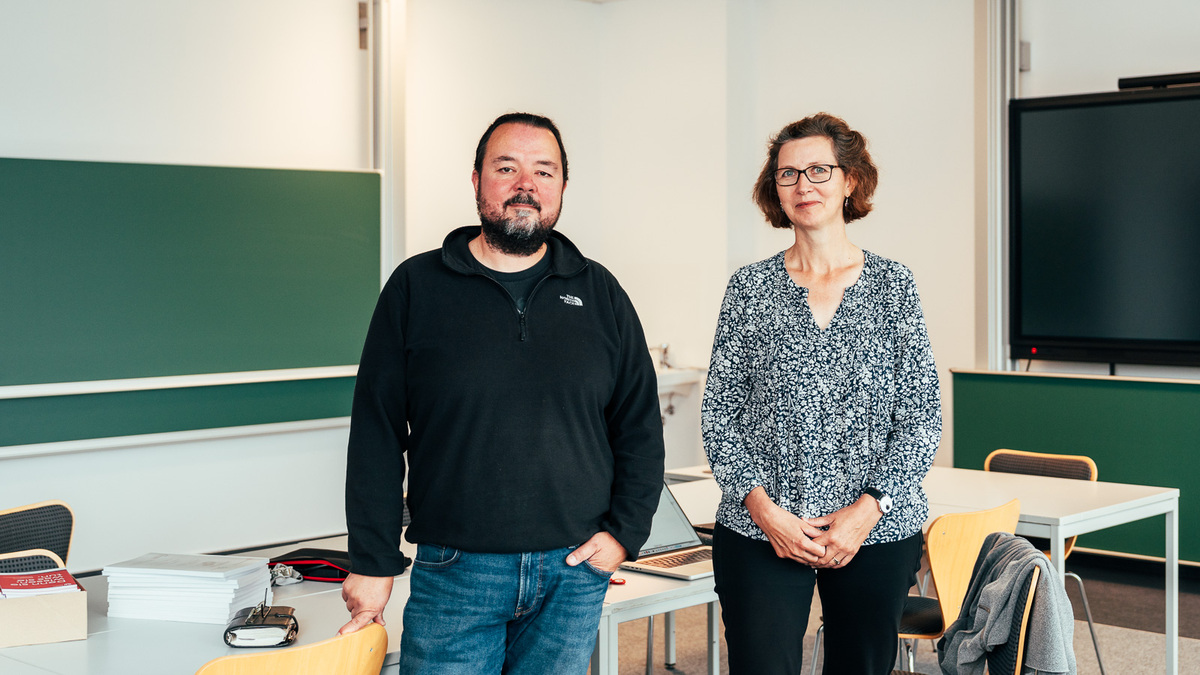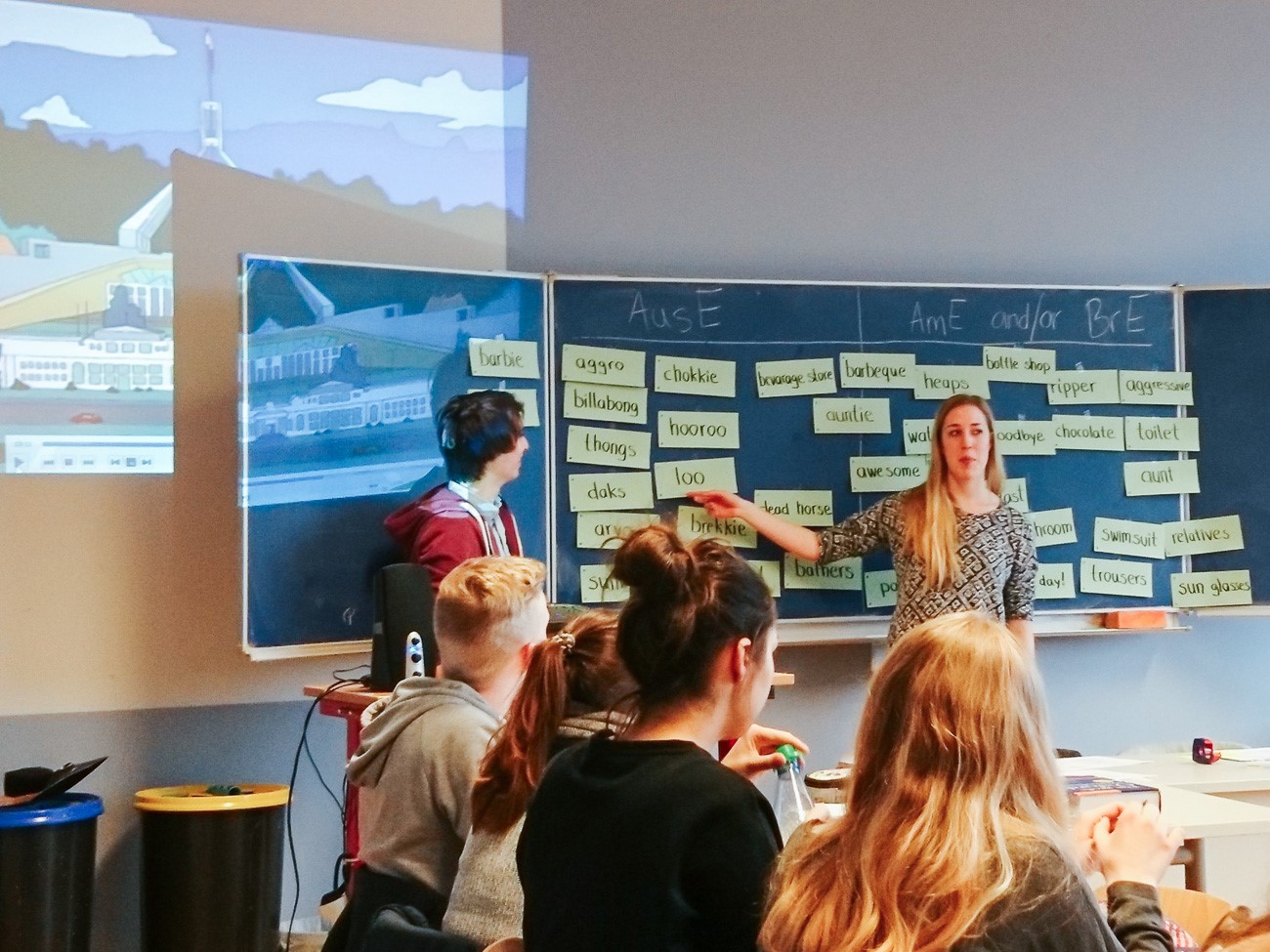
© Lukas Klose / Universität Bremen
Digi-Spotlights: Innovative and Digital Teaching Concepts for Teacher Education
The “Designing Interfaces – Quality Initiative: Teacher Education” subproject researches how cohesion of subject studies and subject-specific didactics studies can be improved with the help of digital resources.
During the course of their degree, teacher education students gain an abundance of subject knowledge. Yet it is not always clear how the subject-specific knowledge relates to other elements of their learning and how all of this can later be relayed to students in a classroom setting. Which digital tools are needed to help synergize the content and content delivery? These are the core topics of Christine Knipping and Marcus Callies’ project “Digi-Spotlights.”
Challenges of Teacher Education
Many teacher trainees particularly appreciate the subject-specific didactics of their teacher education program, as these are very hands-on and directly connected to the classroom. In contrast, it is often more difficult for them to recognize why individual subject studies components of their degree program are relevant and how these are interrelated. Many students also find conveying knowledge of subject matter in a classroom to be difficult. Due to the lacking connections between subject didactics studies and subject studies, many students find their teacher education to be quite fragmented. This can lead to students approaching the subject studies with less motivation and at the end of their degree may mean that there are gaps in their knowledge of the subject matter. Broad knowledge of subject contents as well as good subject-specific didactics are, however, important prerequisites for future teachers’ success in a classroom setting.
Spotlights for a Successful Integration of Subject Studies and Didactics
In the “Digi-Spotlights” project, illustrative innovative teaching concepts called “spotlights” were developed to support students to better synergize subject studies with subject-specific didactics studies. These “spotlights” help to improve and draw connections between knowledge of the specific subject, personal didactic abilities, and current scientific developments. Digital tools assist students with incorporating subject studies and didactic studies, particularly in developing a reflexive ability to act. Spotlights were developed for the subjects English, mathematics, and politics, and will become part of the regular curriculum of these degree programs at the conclusion of the project. A transfer package enables other faculties to implement these teaching concepts in their own degree programs.
Varieties of English in Classroom Learning
The English language program developed the “Varieties of English in Foreign Language Teacher Education – digital” spotlight, which examines the many variations of English, which came about as the language spread and changed within different national and sociocultural contexts. “Due to the increased mobility of school and university students as well as employees, and due to migration, teachers in schools are exposed much more to different varieties of English, and British English is no longer the single standard,” according to Marcus Callies, the subproject leader from English-Speaking Cultures. “For example, there are school and university students from West Africa or Asia, who were socialized in the educational system of their country with the national variety of English used there. A teacher in a German school cannot just tell them that the version of English from their country is wrong and that only British English is allowed; that would be problematic.” Since Callies expects such scenarios to increase, it is very important that teachers appreciate that devaluing certain varieties can potentially be demotivating in class.

© Marcus Callies
Digital workbooks have shown to be a helpful resource in the project, because they are maintained as online databases and reflect adaptations in language development much sooner than printed dictionaries. Students in English degrees also work with speech corpora, large collections of spoken and written language, which are available online. “These can be consulted, for example, when a certain term in English is unknown or seems unusual,” Callies said. They provide information about whether an expression is loaded, as well as how often, in which context, and in which English-speaking regions it is primarily used. These digital resources help students, since they are relatively straightforward, available free of cost, and students can already gain experience using them during their degree.
Basics Together, Specifics Separately with the Y-Model
In developing the “Y-Digimath” spotlight, the primary focus was on the core components of math degrees, synergizing these components, as well as teaching them in a school setting. The Y-Model, which was developed for this, has mathematics students and mathematics education students take beginning courses together and separates them into two groups after two thirds of the degree program. This allows all students to have a common basis of knowledge. The separation after a few semesters is necessary: “It really does make a difference whether I am studying mathematics or mathematics education,” subproject leader Christine Knipping reported. “This combination of following the same path together for a while and then diverging into specifics” has proven itself according to Knipping.
“These spotlight projects show that we are working to improve the quality of teacher education and that we need new and innovative concepts to do so.”
Digital tools used are, amongst others, the “GeoGebra” tool, which can illustrate mathematical correlations very well geometrically. This is used, for example, in the practical phase of the project during “Mathematics Experiment Days.” The goal of this project is for university students to prepare and present specific content for high school students in a way that the essential aspects are easy to understand. Preparing this requires them to recognize themselves which key points are actually relevant. “This is very exciting not only for the school students, but also for their teachers since normal mathematics lessons often do not take place in an experimental format like this,” Knipping said. The “p:ier” e-portfolio, which was developed in the project, is used as a digital learning diary to assess the project. Using this, students can contemplate on a meta-level what subject-content knowledge they have gained from this experiment as well as how to best implement what they have learned didactically.
Flooded with Data
In political science, with its “Data Sprint” spotlight, students are exposed to a great deal of data in a short time period. They must then develop social science questions from this data and decide which to focus on. Through the method developed, students can experience research firsthand and learn to produce results in settings with limited time and space. The goal of the Data Sprint is to sensitize prospective political science teachers to the relevance of the subject-specific content and show them possibilities for addressing this information in the classroom. Digital tools play a role in this because they provide the information needed for students to navigate their way through these issues. “These spotlight projects show that we are working to improve the quality of teacher education and that we need new and innovative concepts to do so. With the current teacher shortage, this is a huge issue at the moment, since the quality of teaching is quite crucial for the future education of students,” Marcus Callies said.
Further information
Website Digi-Spotlights (available in German only)